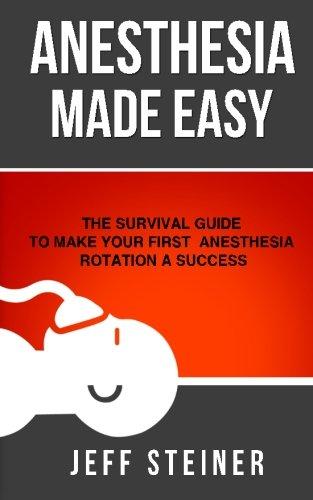Anesthesia Made Easy: The Survival Guide to Make Your First Anesthesia Rotation a Success


to find more, be sure to visit my account and explore the deverse selection available. copy and paste link to download this book
https://good.readbooks.link/issu/0989840131
Why you need this book:Most introductory anesthesia books are too long and too complex. Where do you begin learning about anesthesia when the basic books are over 800 pages long and weigh four pounds? Even when you do read these books, how will you translate the information into something you can use in the operating room when you are first starting out? Welcome to Anesthesia Made Easy.I wrote this book to introduce you to anesthesiology. It is part education guide (to teach you the basics of anesthesia) and part survival guide (to teach you how to apply these basics while in the operating room). It includes the basics of anesthesia without getting too far into the weeds and also gives you a practical approach that will get you started moving in the right direction.New anesthesiology students struggle with which book to read and where to start. This book will give you not only a solid foundation upon which to start your career but also organize the information in such a way that you can actually use it. At under 200 pages, it is the one basic anesthesia book that you can reasonable read cover to cover quickly. If you are doing anesthesia observations or shadowing to see if
anesthesia is a good fit for you, you should start with chapter 1, “Hoto Get the Most from Your Anesthesiology Observation.”Then read chapter 4, “Ansthesiology Basic Concepts,”and chapter 5, “Geting Around in the OR,”to learn the culture of the OR—thy will bring you a long way.If you are applying to AA or CRNA school, then read this book cover to cover before you interview. It will give you a working knowledge of the type of training you will receive. It may also help you in your interview process to give you answers to simple questions about anesthesia care. If you are an airway rotator, concentrate on chapter 19, “Aiway Exam and Evaluation,”chapter 7, “Baic Anesthesia Pharmacology: Medications,”and chapter 24 “Adlt Airway Management,”chapter 25 “Peiatric Airway Management,”and chapter 27 “Raid Sequence Induction (RSI).”If you are on your first anesthesia rotation, start at the front of Anesthesia Made Easy and work your way through before you start your rotation. This book is meant to be a quick read. Bring the book with you to the operating room and take notes in the notes section. Looking for more information about anesthesiology?Check out AnesthesiaMadeEasy.com/AMZ and see what we have to offer.Praise for Anesthesia Made Easy“Aconcise review of the basic fundamentals of anesthesiology. Written in outline form, this book provides the essentials for anyone interested in anesthesiology. I would highly recommend for medical students, beginning anesthesia residents, AAs and CRNAs.”Eugene Chung, D.O. - CA-1 Resident“Prviding an introductory approach on a topic as broad and in depth as anesthesia is nearly impossible, and therefore many novices find themselves up to their elbows in thousand page textbooks not knowing where to start. Dr Steiner has successfully compiled a basic guide that provides a starting point for providers just beginning their journey into the world of anesthesia."Ryan A Sexton, RN, MSN, CRNAPracticing CRNA "Agreat book for medical students and residents looking to get the most out of their anesthesia rotation! It provides useful information on airways, common anesthetic medications, and basic anesthesia theory. It also gives a small glimpse into the OR from the unique perspective of the anesthesiologist.”Amy P. Woods, M.D. - Faculty Anesthesiologist
